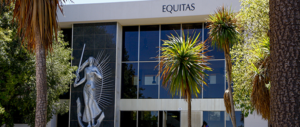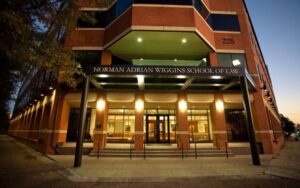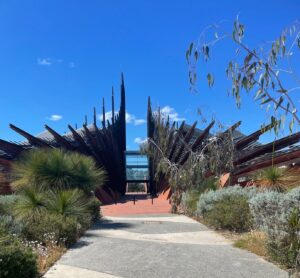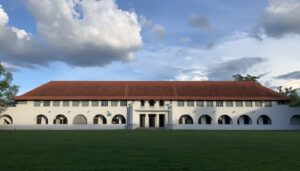COVID-19 REGIONAL UPDATES
AFRICAN REGION

UNIVERSITY OF THE FREE STATE, SCHOOL OF LAW, SOUTH AFRICA
It is the vision of the University of the Free State (UFS) Faculty of Law to provide broad access to high quality, relevant, innovative, and research-led undergraduate and postgraduate legal programs that place transformative constitutionalism and social justice at the core of a regionally and nationally relevant and globally competitive and responsive curriculum. The UFS Faculty of Law is committed to establishing itself as a center of high-quality research, teaching, and learning, as well as community service learning and engagement, all presented with integrity and professionalism. The faculty conducts all of its work cognizant of its responsibility to contribute to the communities of which it is part – at local, regional, national, and international levels. Through its research, teaching, and community engagement, the faculty seeks to contribute to the constitutionally mandated transformation of society, and in particular the promotion of justice, fairness, non-discrimination, nonracialism, and diversity. In line with the above, the Faculty of Law is committed to serving legal scholarship, the legal profession, and society at large by offering high-quality and relevant education and research. Through their study at this faculty, UFS Law graduates will be enabled to contribute to the search for justice in whatever walk of life they find themselves after their studies.
CURRENT SITUATION
The fourth academic term at the University of the Free State, South Africa commenced on October 11, 2021, signaling that we are swiftly moving towards the end of the academic year, with the end-of-the-year examination around the corner. This has been another extraordinary year for its staff and students, for the country, and the world. Many countries have opened their borders, as millions of people around the world are receiving the COVID-19 vaccine. The relaxing of COVID-19 restrictions in the African region and in South Africa has also allowed the University of the Free State (UFS) to adjust its mitigation strategies as of September 23, 2021. Some students are returning to campuses for face-to-face learning as a result of relaxation. These strategies remain in place following the change of South Africa’s lockdown to an adjusted Level 1 on October 1st, 2021. However, due to challenges with vaccine availability and access, as well as a level of skepticism in safety and efficacy, the vaccination rate in the country remains alarmingly low. Yet, the Law faculty of the University of the Free State has indicated that it will retain the online learning strategy until January 2022. Such a decision continues to carry with it a multiplicity of critical challenges. A survey done by Amnesty International at the start of the pandemic-related restrictions indicated that, nationally, only 22% of households have a computer and 10% internet connection. In two provinces, the Northwest and Limpopo provinces, only 3.6% and 1.6% respectively had access to the internet at home. To remedy this challenge, universities in South Africa sought to provide students with free laptops which came with zero-rated access to educational material on the Internet. However, studies and personal experience shows that the digital infrastructure divide—the gap between those who have and do not have access to computers and the Internet—continues to be a huge factor limiting the suitability of e-learning in the South African context and indeed the rest of Africa.
AMERICAS REGION

CAMPBELL UNIVERSITY, SCHOOL OF LAW, US
Campbell Law School is a unique community of diverse individuals brought together by a singular purpose—to use the practice of law in order to create a more just and merciful society. It is dedicated to creating compassionate lawyers who are fully prepared for the challenges of the real world.
Campbell Law is a highly demanding, purposely small, intensely personal community of faculty and students whose aim, guided by transcendent values, is to develop lawyers who possess moral conviction, social compassion and professional competence, who view the practice of law as a calling to serve others and to create a more just society.
CURRENT SITUATION
At Campbell University, School of Law, both students and faculty are back on campus, but must wear masks. If a student or faculty member feels ill, then they are asked to stay home, and either watch the live stream or recorded version of the lectures. A negative test is required to return to campus.
ASIA-PACIFIC REGION

EDITH COWAN UNIVERSITY, SCHOOL OF BUSINESS AND LAW, AUSTRALIA
Located within ECU’s Joondalup Campus, the School of Business and Law is renowned for an innovative approach to education. It challenges students to develop their talents and prepares them to make a difference. Courses are designed to give students a great mix of latest theory, practical work experience and key employability skills. Whether you aspire to become a criminal lawyer, have your sights set on the business world as a banker, or have your heart set on event, sport, or tourism management, the school will help you achieve your goals. Its aim is to develop strong, capable leaders who will contribute to the real world of business or law. To do that, the school offers an extremely supportive and stimulating learning environment. The school boasts a strong academic standing, award-winning students’ achievements and tertiary education programs that are highly regarded by their respective industries.
CURRENT SITUATION
Due to Western Australia having removed almost all restrictions, life at Edith Cowan University (ECU) is similar to that before the pandemic. Students are permitted on campus at any time, in-person classes are being held, and ECU venues are no longer subject to capacity restrictions. Even prior to the pandemic, ECU offered online learning for students, and this remains an option, despite all students being permitted to attend on-campus classes.

THE NATIONAL UNIVERSITY OF SINGAPORE, FACULTY OF LAW, SINGAPORE
The National University of Singapore Faculty of Law is widely regarded as Asia’s leading law school. Staffed by an outstanding permanent faculty, diverse in origin and qualifications, NUS Law is dedicated to building a vibrant community and creating an environment that facilitates critical thinking and reflection on the fundamental legal issues confronting our interconnected world. Located in Singapore, which for more than a century has been a commercial hub at the crossroads of Asia, NUS Law is very much Asia’s Global Law School. Since 1957 our curriculum has been infused with perspectives from other jurisdictions and disciplines. This tradition has accelerated in recent years, providing a legal education that is comparative, international, and multi-disciplinary. The Law School hosts many visiting faculty and students from every continent, offering a lively, cosmopolitan atmosphere both inside and outside the classroom. The strength of the NUS Law curriculum lies in the broad and diverse range of subjects it offers. In addition to a rigorous core curriculum, students can choose electives in areas ranging from Asian legal studies to banking and finance, from public international law to intellectual property, or from arbitration to jurisprudence. The aim is to provide a liberal education that enables our graduates to think critically and creatively, as globally-oriented lawyers with a strong sense of their role in society. Global, regional, and uniquely Singaporean perspectives on legal issues are all evident in the research produced by our faculty. The professors at NUS Law are not only engaged in a constant search for better legal solutions to the issues that confront all societies but are also continually challenging accepted wisdom and conventional norms by raising new questions and problems to be confronted. Their work stretches across all aspects of law and appears in the most prestigious journals as well as books published by leading university presses around the world. Singapore is an ideal place to study or research law, with excellent facilities and infrastructure, cutting-edge legal work, and exceptional faculty and students.
CURRENT SITUATION
In light of the COVID-19 pandemic, classes at NUS Law have been conducted on a hybrid basis, with a combination of online classes and face-to-face classes. Face-to-face classes are capped at a maximum of 50 persons per venue and are subject to safe distancing measures. Staff and students are required to wear masks at all times. Staff and students are required to have a valid FET test result before coming to campus. To this end, staff and students have been issued FET test kits free of charge.
EUROPEAN REGION
MASARYK UNIVERSITY, SCHOOL OF LAW, CZECH REPUBLIC

Masaryk University, School of Law, is one of the four public law schools in the Czech Republic, and also one of the four founding schools of Masaryk University. It is located in the center of Brno, the second-largest city in the Czech Republic. The Dean of the Faculty of Law is JUDr. Mgr. Martin Škop, Ph.D. The school of law as well as the Masaryk University was founded in 1919. In 1950 it was abolished and later renewed in 1969. As each Masaryk University school has its distinctive color, the Faculty of Law is distinguished by its purple color. The logo of the faculty depicts the figure of Justice with a sword and rays; the circle around it is inscribed with “Universitas Masarykiana Brunensis. Facultas iuridica”. The School of Law building holds ceremonies, such as matriculation or graduation, even for students of other faculties. The school offers bachelor’s, master’s, and doctoral study programs, as well as other lifelong learning programs.
CURRENT SITUATION
The operation of Masaryk University is governed by a so-called “university traffic light”, the levels are determined by the Masaryk University Crisis Staff. The traffic light colors range from white, green, yellow, to red. These colors determine the degree of risk of Covid-19, from the lowest to the highest. The current color is white, meaning that face-to-face teaching is limited to a maximum of 150 people at a time in one room, and face masks are mandatory in common areas and during the transition between classes; masks are voluntary in other cases. This traffic light is used for all faculties of Masaryk University, including the School of Law.
For students who live in dormitories, the university requires testing every seven days, except for students who have been vaccinated. Students with symptoms of infectious diseases are not allowed to enter the university. Canteens are closed for now, but supposedly they should be open again soon. The school’s library is open, but students should keep a 6-foot distance from each other and wear face masks. There are some face-to-face lectures, and there are online classes. Seminars are also face-to-face. Depending on the development of the epidemic, classes may go back online. Regardless, credits, tests, and exams, whether written or oral, will be realized for both in person and online classes, depending on the guarantor of each subject.
